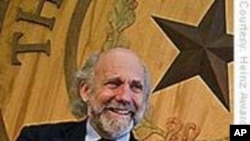<!-- IMAGE -->
Thomas Smith is an energy efficiency advocate and a key player in crafting renewable energy legislation. Smith is one of the winners of the 2009 Heinz Awards, which recognize outstanding individuals for their contributions to society. This year, the awards commemorate the late Senator John Heinz's long-standing commitment to the environment by bestowing $100,000 awards to 10 individuals whose achievements have helped bring about a cleaner, greener and more sustainable planet.
For more than two decades, Thomas Smith has been working tirelessly with one clear goal, "to promote renewable energy and energy efficiency as ways of reducing our global warming impact on the rest of the world," he says.
Texans' energy consumption leaves a big 'carbon footprint'
<!-- IMAGE -->Smith has been director of the Texas office of Public Citizen, a consumer and environmental advocacy group, since 1985. His efforts to combat global warming in Texas have been challenging because of the large size of the state's 'carbon footprint.'
<!-- IMAGE -->"In Texas, we lead now the nation," he says. "If we were a nation on our own, we would be seventh in the world in terms of global-warming emissions."
He points out that there were other obstacles to achieving his goal Texas, including the very conservative and very pro-business profile of the state.
"In Texas, the largest businesses are the oil and gas industries and the electric utilities," he explains. "And when you look at Texas, or the rest of the nation, oftentimes it's the electrical generating units that are the largest single sources of pollution in any given state," Smith says.
Smith set in motion a movement to control pollution
To reduce air pollution, promote energy efficiency and develop clean energy resources, Smith says Public Citizen had to create a grassroots movement.
"One of the things we've learned over time is that the only way to beat organized polluters is with organized people," he says. "So over the years we have worked with community after community to teach grassroots activists about the problem, what solutions there are to the problems of pollution and how they can make a difference. Folks have then gone on to lobby their legislators and their city councils and ask them to change the way they generate electricity, to bring on more renewable [energy sources], and to reduce energy use through energy efficiency."
How the grassroots movement led to powerful change
<!-- IMAGE -->In other words, he says, his group's advocates are saving the environment with democracy.
"We have a simple rule: Ten people getting 10 other people to write letters can change policy anywhere in the country," he says. He adds, "Participatory democracy has led to significant changes in law that have ended up paying off, big-time, in terms of pollution reductions. In just about every session of the [Texas] legislature for the last 25 years, we've managed to pass significant legislation through citizen activism."
Texas-sized success for renewable energy program
<!-- IMAGE -->That's how the Texas Renewable Portfolio Standard was created and passed ten years ago.
"It established a modest goal of having 2000 megawatts, or roughly 3 percent of the state's energy, come from renewables by 2009," he says. "But once the utilities got their wires out to the wind turbines, they began to realize just how valuable renewable energy was. As a result, by the end of next year, we'll probably have 10,000 megawatts of renewables up and operating in various parts of Texas, far exceeding our 2009 goal and achieving our goal for 2025, 15 years early," he says.
Smith's parents are his role models
Fighting for environmental issues, Smith says, has never been easy, but it's the most rewarding work he has ever done. He credits his parents for raising him as an environmentalist.
"Without a doubt, my parents were both relatively committed environmentalists," he recalls. "We as a family took weekly adventures to some outdoors location regardless of how cold it was. My father, in particular, was somebody who was very fond of plants and spent a lot of time teaching us about the interrelatedness of all living things and the way eco-systems worked," he says.
Thomas Smith's passion for keeping our eco-systems working keeps him
motivated, and his accomplishments serve as a model for other environmentalists
around the country.




